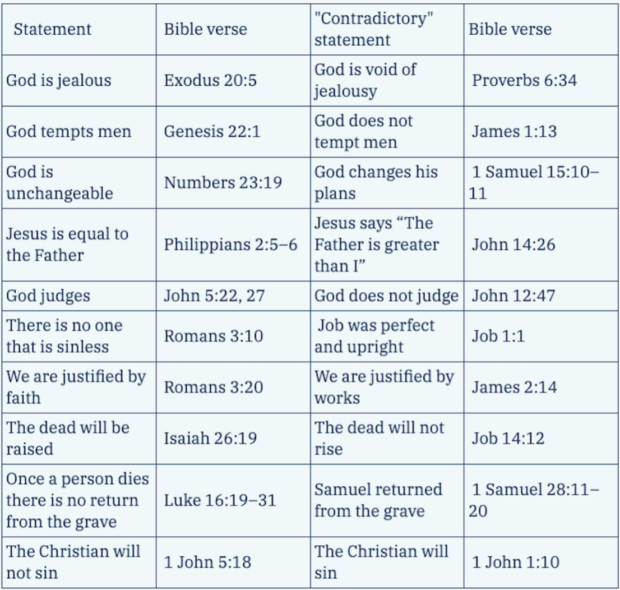The Bible tells us that all Scripture is authored by God (2 Tim 3:16). This implies that since God is the author and he is without error, the Scriptures are also without error. However, we often come across passages in the Bible that seem to contradict each other.
These passages are hard to understand. Because of that difficulty, some can be quick to believe that what they’re reading is a contradiction. Others may expect or already believe that these verses don’t contradict each other—yet they can’t explain how to reconcile them. (Continue reading for assistance in that area.)
2 reasons why Bible verses seem like contradictions
I would argue that the appearance of contradictory verses is a result of the reader’s interpretation.
Christian author William Arndt wrote the following regarding this subject:
The difficulties which are pointed to in the Bible by its friends and its foes are of many kinds. The great majority of them are entirely of the person’s own making and will vanish when prayerfully studied. 1
The apostle Peter also suggests that there are some passages we do not understand due to our ignorance (2 Pet 3:16).
And count the patience of our Lord as salvation, just as our beloved brother Paul also wrote to you according to the wisdom given him, as he does in all his letters when he speaks in them of these matters. There are some things in them that are hard to understand, which the ignorant and unstable twist to their own destruction, as they do the other Scriptures. (2 Pet 3:15–16)
In other words, we may need to learn more about a passage before we can understand it.
Another source of seeming contradictions is ourselves—who we are, our hearts and minds. As R. A. Torrey argues,
The Bible is perfect, but we, being imperfect, have difficulty with it. As we grow more and more into the perfection of God, our difficulties grow ever less and less, and so we are forced to conclude that when we become as perfect as God is, we shall have no more difficulties whatever with the Bible.2
It is my goal here to make clear that the Bible does not contain contradictions, but rather paradoxes.
What is a paradox?
A paradox is a perceived contradiction that upon further study is found to be harmonious.
Conflicts arise when it seems the Bible is saying two different things about the same subject. However, when we employ simple Bible interpretation techniques, we soon realize that the verses are in harmony with each other.
Perceived contradictions—paradoxes—can be found in both testaments. These areas of perceived contradictions cover topics such as culture, language, morality, eschatology, worship, and many other doctrinal issues.
10 examples of apparent contradictions in the Bible

How to consider these passages: an introduction to Bible interpretation
To overcome perceived contradictions in the Bible like these, turn to observation and interpretation.
Observation allows you to inspect the passage without judgment.
You are looking simply for information. Observe the content and context of the passage.
- Ask these questions:
- Who are the main characters in the passage?
- What is going on?
- When and where did the events occur?
- Look up the meaning of the words in the verses.
- Look at literary context and the placement of words.
The same word can mean something totally different based on the words surrounding it. For example, the word “trunk” in English can have more than one meaning based on its context. If we say, “I placed my winter clothes in the trunk,” we know it is a trunk used for storage.
In contrast, if we say, “Do not water around the base of the trunk,” we know we are talking about the trunk of a tree and not a storage unit. In the same way, word usage in the Bible is based on context.
- Consider the culture, language, history, and religious beliefs.
Use the information gleaned from the observation phase to interpret the passage.
Do further word study, asking these questions: “What is the meaning of the word in its original language?” and, “How was it used in ancient times?”
Finally, ask, “What is the overall principle that can be adopted for contemporary Christians?”
This is not a process exclusive to scholars or theologians—every Christian can rightly divide the Word of God.
***
Tools to help with Bible interpretation
If you’re wondering how to learn more about culture, context, history, etc., these three types of resources are excellent places to start: study Bibles, Bible dictionaries, and Bible commentaries.
An excellent way to combine all of these Bible study tools in one and get powerful features to help you use them is to get a Bible app like Logos. It’s free and available for web, mobile, and desktop.
***
Working through examples of apparent contradiction
There are numerous Bible paradoxes, but we will work through the following well-known apparent contradictions together.
Proverbs 26:4 and Proverbs 26:5
In comparing Proverbs 26:4 and Proverbs 26:5, the two verses seem a contradiction by the author (Solomon). Verse 4 says to not answer a fool, but verse 5 seems to suggest that a fool should be answered.
But this is a paradox, not a contradiction. Here’s why: Proverbs 26:4 speaks against engaging someone who is foolish. Arguing with a fool or irrational person will draw you into their web, and you will become foolish yourself.
Verse 5 speaks of engaging a fool in another sense. There are times when a foolish person must be corrected, or things will continue to get worse. In this case, we are providing godly wisdom to the fool and not quarreling with them as in verse 4. It would only be contradictory if verse 4 stated that we should never speak to a fool at any time.
Matthew 5:6 and John 6:35
We can also find what might seem a contradiction when we compare Matthew 5:6 and John 6:35. Matthew 5:6 tells us that those who do hunger for righteousness are blessed.
However, John 6:35 seems to say the opposite. John 6:35 quotes Jesus as saying “the one who comes to me will not be hungry.” Matthew writes that a follower of Christ will be blessed if they hunger. However, John’s Gospel seems to suggest that if we believe in Jesus, we will never be hungry.
Bible observation and interpretation again show that these verses are in harmony. In Matthew 5:6, Jesus is using physical examples to illustrate spiritual principles. In the same way that hunger compels us to seek food and thirstiness to seek water, we need to seek righteousness. He is using physical realities to convey a spiritual concept.
In John 6:35, Jesus refers to himself as the “Bread of Life.” This phrase is not to be taken literally. Jesus is not an actual loaf of bread. However, he uses this metaphor to convey a message. In the same way that bread satisfies the body, if his disciples follow him, they will receive spiritual food. It is within this context that we find the next portion of the text. Because Jesus is the bread of life, those who follow and obey his teachings will not be hungry or thirsty as it relates to spiritual matters. Again, these two verses are not contradictory, but complementary.
Romans 3:28 and James 2:24
Romans 3:28 tells us that a person is justified by faith alone and not by working for it. This passage seems clear.
However, when we read James’ letter, we discover James suggests that a believer is justified by their works and not faith alone.
Here’s why this is not a contradiction. Paul is saying one is saved by faith and cannot work for it. On the other hand, James is appealing to those who are already saved. James argues that because they are already Christians, there must be an extension of their faith evidenced by what they do (works). Regarding this passage, John Haley concluded:
There is no collision between Paul and James. They merely present different aspects or relations of the same great truth. Paul is arguing against self-righteous religionists, who rely for salvation upon external morality, upon mere works; James addresses those who maintain that, provided a man’s belief is correct, it matters little what his conduct is; that a bare assertive faith is sufficient for salvation, without its living fruits in a holy life.3
Conclusion
The Bible contains passages that readers may find difficult to understand. Those passages may even seem contradictory. However, we must keep in mind that the Bible is inerrant (void of error).
If we see contradictions, it is due to our lack of understanding, and we must struggle with the text until arriving at the correct interpretation. Using the rules of observation and interpretation will help us to resolve any perceived contradictions we may encounter when reading the Scriptures.
***
Related resources
Navigating Tough Texts: A Guide to Problem Passages in the New Testament
Regular price: $16.99

The Divine Origin of the Bible: Its Authority and Power Demonstrated and Difficulties Solved
Regular price: $9.99
Related articles
- All about Hermeneutics: A Guide to Interpreting God’s Word Faithfully
- How to Study a Psalm: 4 Keys to Interpretation
- Bible Study: How to Dig Deep into God’s Word
- William Arndt, Bible Difficulties and Seeming Contradictions (St. Louis, MO: Concordia Publishing House, 1987), 9–10.
- R. A. Torrey, Difficulties and Alleged Errors and Contradictions in the Bible (Las Vegas, NV: Crossreach Publications, 2023), 19.
- John Haley, Alleged Errors of the Bible: Addressing Problematic Passages in Scripture (New Kensington: Whitaker House Publishers, 2019), 147.






